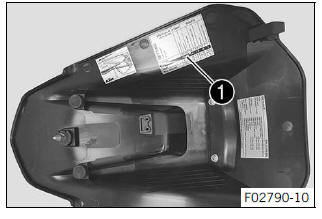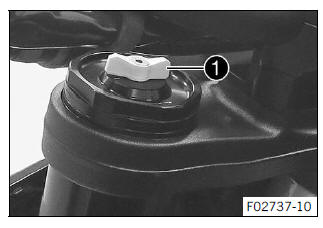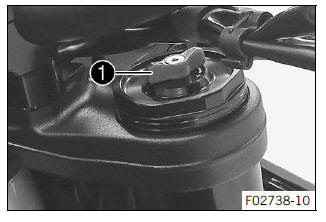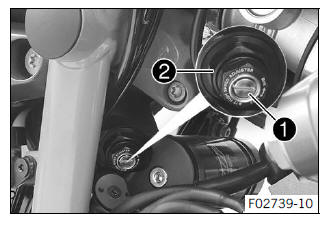 KTM 890 Duke R - Owner's Manual > Fork/shock absorber
KTM 890 Duke R - Owner's Manual > Fork/shock absorber

The fork and the shock absorber offer many options of adapting the chassis to your riding style and the payload.
Info
To help you adapt the vehicle, we have summarized our findings in Table 1. You can find the table under the passenger seat cover.
These adjustments should be understood as a guideline and should always be the basis for one's personal suspension setting.
Do not change the adjustments at random, as otherwise the riding characteristics could deteriorate, particularly at high speeds.
Adjusting the compression damping of the for
Info
The hydraulic compression damping determines the fork suspension behavior.

- Turn white adjuster 1 clockwise as far as it will go.
Info
Adjuster 1 is located at the upper end of the left fork leg.
The compression damping is located in left fork leg COMP (white adjuster). The rebound damping is located in right fork leg REB (red adjuster).
- Turn counterclockwise by the number of clicks corresponding to the fork type.
Guideline

Info
Turn clockwise to increase damping; turn counterclockwise to reduce damping during compression.

- Turn red adjuster 1 clockwise as far as it will go.
Info
Adjuster 1 is located at the upper end of the right fork leg.
The rebound damping is located in right fork leg REB (red adjuster). The compression damping is located in left fork leg COMP (white adjuster).
- Turn counterclockwise by the number of clicks corresponding to the fork type.
Guideline

Info
Turn clockwise to increase the damping; turn counterclockwise to reduce damping when the shock absorber rebounds.
Compression damping of the shock absorber
The compression damping of the shock absorber is divided into two ranges: high-speed and low-speed.
High-speed and low-speed refer to the compression speed of the rear wheel suspension and not to the vehicle speed.
The high-speed compression adjuster, for example, has an effect when riding over an asphalt edge: the rear wheel suspension compresses quickly.
The low-speed compression adjuster has an effect, for example, when riding over long ground swells: the rear wheel suspension compresses slowly.
These two ranges can be adjusted separately, although the transition between high-speed and low-speed is gradual.
Thus, modifications in the high-speed range affect the compression damping in the low-speed range and vice versa.
Adjusting the low-speed compression damping of the shock absorber
Caution
Risk of injury Parts of the shock absorber will move around if the shock absorber is detached incorrectly.
The shock absorber is filled with highly compressed nitrogen.
- Please follow the description provided. (Your authorized KTM workshop will be glad to help.)
Info
The effect of the low-speed compression adjuster can be seen in slow to normal compression of the shock absorber.

- Turn adjusting screw 1 clockwise with a screwdriver as far as the last perceptible click.
Info
Do not loosen fitting 2!
- Turn counterclockwise by the number of clicks corresponding to the shock absorber type.
Guideline

Info
Turn clockwise to increase damping; turn counterclockwise to reduce damping during slow to normal compression.
See also:
 KTM 890 Duke R - Owner's Manual > Adjusting the high-speed compression damping of the shock absorber
KTM 890 Duke R - Owner's Manual > Adjusting the high-speed compression damping of the shock absorber
Caution Risk of injury Parts of the shock absorber will move around if the shock absorber is detached incorrectly. The shock absorber is filled with highly compressed nitrogen. Please follow the description provided. (Your authorized KTM workshop will be glad to help.)

 BMW G310GS
BMW G310GS Honda CBR125RW
Honda CBR125RW Husqvarna 401 Vitpilen
Husqvarna 401 Vitpilen KTM 890 Duke R
KTM 890 Duke R Mash Dirt Track 650
Mash Dirt Track 650 Peugeot Kisbee
Peugeot Kisbee Yamaha Tracer MT-09
Yamaha Tracer MT-09 Honda CBR125RW
Honda CBR125RW Peugeot Kisbee
Peugeot Kisbee Yamaha Tracer MT-09
Yamaha Tracer MT-09